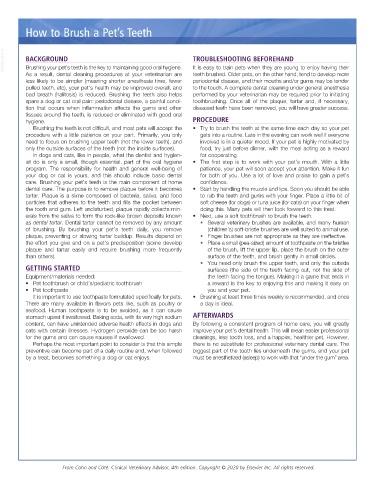Page 3172 - Cote clinical veterinary advisor dogs and cats 4th
P. 3172
How to Brush a Pet’s Teeth
VetBooks.ir BACKGROUND TROUBLESHOOTING BEFOREHAND
It is easy to train pets when they are young to enjoy having their
Brushing your pet’s teeth is the key to maintaining good oral hygiene.
As a result, dental cleaning procedures at your veterinarian are teeth brushed. Older pets, on the other hand, tend to develop more
less likely to be simpler (meaning shorter anesthesia time, fewer periodontal disease, and their mouths and/or gums may be tender
pulled teeth, etc), your pet’s health may be improved overall, and to the touch. A complete dental cleaning under general anesthesia
bad breath (halitosis) is reduced. Brushing the teeth also helps performed by your veterinarian may be required prior to initiating
spare a dog or cat oral pain: periodontal disease, a painful condi- toothbrushing. Once all of the plaque, tartar and, if necessary,
tion that occurs when inflammation affects the gums and other diseased teeth have been removed, you will have greater success.
tissues around the teeth, is reduced or eliminated with good oral
hygiene. PROCEDURE
Brushing the teeth is not difficult, and most pets will accept the • Try to brush the teeth at the same time each day so your pet
procedure with a little patience on your part. Primarily, you only gets into a routine. Late in the evening can work well if everyone
need to focus on brushing upper teeth (not the lower teeth), and involved is in a quieter mood. If your pet is highly motivated by
only the outside surfaces of the teeth (not the inside surfaces). food, try just before dinner, with the meal acting as a reward
In dogs and cats, like in people, what the dentist and hygien- for cooperating.
ist do is only a small, though essential, part of the oral hygiene • The first step is to work with your pet’s mouth. With a little
program. The responsibility for health and general well-being of patience, your pet will soon accept your attention. Make it fun
your dog or cat is yours, and this should include basic dental for both of you. Use a lot of love and praise to gain a pet’s
care. Brushing your pet’s teeth is the main component of home confidence.
dental care. The purpose is to remove plaque before it becomes • Start by handling the muzzle and lips. Soon you should be able
tartar. Plaque is a slime composed of bacteria, saliva, and food to rub the teeth and gums with your finger. Place a little bit of
particles that adheres to the teeth and fills the pocket between soft cheese (for dogs) or tuna juice (for cats) on your finger when
the tooth and gum. Left undisturbed, plaque rapidly collects min- doing this. Many pets will then look forward to this treat.
erals from the saliva to form the rock-like brown deposits known • Next, use a soft toothbrush to brush the teeth.
as dental tartar. Dental tartar cannot be removed by any amount • Several veterinary brushes are available, and many human
of brushing. By brushing your pet’s teeth daily, you remove (children’s) soft-bristle brushes are well suited to animal use.
plaque, preventing or slowing tartar buildup. Results depend on • Finger brushes are not appropriate as they are ineffective.
the effort you give and on a pet’s predisposition (some develop • Place a small (pea-sized) amount of toothpaste on the bristles
plaque and tartar easily and require brushing more frequently of the brush, lift the upper lip, place the brush on the outer
than others). surface of the teeth, and brush gently in small circles.
• You need only brush the upper teeth, and only the outside
GETTING STARTED surfaces (the side of the teeth facing out, not the side of
Equipment/materials needed: the teeth facing the tongue). Making it a game that ends in
• Pet toothbrush or child’s/pediatric toothbrush a reward is the key to enjoying this and making it easy on
• Pet toothpaste you and your pet.
It is important to use toothpaste formulated specifically for pets. • Brushing at least three times weekly is recommended, and once
There are many available in flavors pets like, such as poultry or a day is ideal.
seafood. Human toothpaste is to be avoided, as it can cause
stomach upset if swallowed. Baking soda, with its very high sodium AFTERWARDS
content, can have unintended adverse health effects in dogs and By following a consistent program of home care, you will greatly
cats with certain illnesses. Hydrogen peroxide can be too harsh improve your pet’s dental health. This will mean easier professional
for the gums and can cause nausea if swallowed. cleanings, less tooth loss, and a happier, healthier pet. However,
Perhaps the most important point to consider is that this simple there is no substitute for professional veterinary dental care. The
preventive can become part of a daily routine and, when followed biggest part of the tooth lies underneath the gums, and your pet
by a treat, becomes something a dog or cat enjoys. must be anesthetized (asleep) to work with that “under the gum” area.
From Cohn and Côté: Clinical Veterinary Advisor, 4th edition. Copyright © 2020 by Elsevier Inc. All rights reserved.

